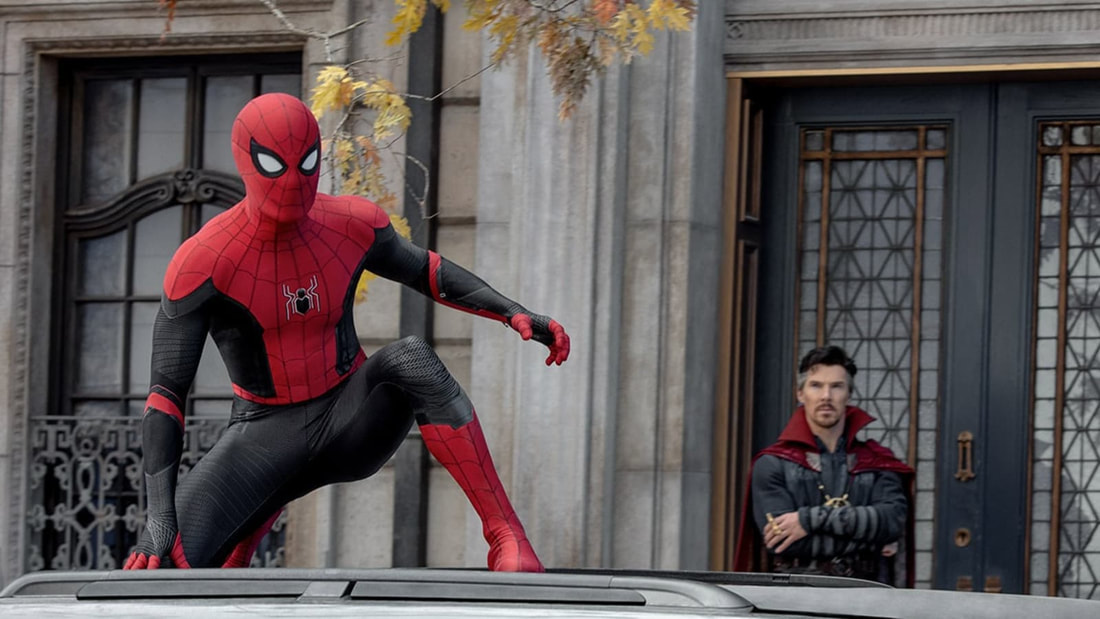Marvel has bet its future on the idea of the multiverse. No less than four properties in the immediate period before or after No Way Home have made this a central conceit, and of those, only one (TV show Loki) has done anything inventive or original with the concept. Everything else has demonstrated no risk or imagination, a failing made doubly disappointing when something like Rick and Morty has existed for years and alumni of that show have joined Marvel in creative capacities. Instead, multiverses have been used as a vehicle for cheap cameos, as is the case in No Way Home. This is the final victory of Family Guy, where mass-market filmmaking has been degraded to the level of Remember When. The franchise trappings of No Way Home only serve to remind viewers how good Molina was in Spider-Man 2, a highwater mark for superhero movies that No Way Home sucks the life from. It all reeks of corporate directives, of a pathetic need to burnish Holland’s reputation amongst past portrayers of Spider-Man who are also pulled through Strange’s spell. Tobey Maguire’s Peter Parker couldn’t save Otto Octavius, but Tom Holland can. Meanwhile, down the hall at Sony, a separate Spider-Man property has figured out multiverse storytelling in such a way that embarrasses this film, indicating that it’s not Sony that has the problem but Marvel, a company mired in a creative rut even as it continues to rake in insane box office receipts.
On the other hand, Sony isn’t wrong to obliquely brag about Holland. The core cast of his Spider-Man run, along with Watts and writers Chris McKenna and Erik Sommers, have locked onto something successful. The relative age-appropriateness of Holland, Batalon, and Zendaya goes a long way towards cultivating the goodwill that this run of the franchise coasts on. Watts has never figured out how to coherently film an action scene, but he’s consistently been a strong director of younger casts, dating back to his pre-Spider-Man work on Cop Car. Holland, Zendaya, and Batalon do have strong, earned chemistry together, so much so that the increasingly tired Marvel banter still sounds funny filtered through Zendaya’s physicality. The franchise has also done a great job putting niche comedians alongside them like Martin Starr, JB Smoove, and Hannibal Buress, though they’re not much of a part of No Way Home. In their place are old Spider-Man villains and old Spider-Men, the standout of which is Andrew Garfield. He demonstrates how much he might’ve thrived with a director better able to match his energy as a self-deprecating goofball, as opposed to the emo skater angle that characterized his run. Watts seems anchored to this franchise for the ongoing future, and one can’t help but think of the low-key comedies that he might’ve made instead.
Garfield is given a direct challenge for most welcome return by Willem Dafoe, an actor who has only gotten hammier in the twenty years since he portrayed Norman Osborne aka Green Goblin. He emerges as the villain least amenable to rehabilitation, and his sneering, rubber-faced malice jumps out of a different era of superhero films to liven up the current one. Michael Keaton’s Vulture, still the smartest part of Holland’s run, wouldn’t know what to do with this guy. Dafoe snarfs down on his scenes with gusto, whether he’s in villain mode or a defenseless and disoriented old man that Peter’s Aunt May (Marisa Tomei) takes pity on. He and Molina both harken back to Sam Raimi’s Spider-Man films, all of which took big chances that sometimes paid off (Spider-Man 2’s operating room massacre) and sometimes didn’t (Peter Parker as a jazz club enthusiast). Conversely, the stage-managed Watts Spider-films are tame and predictable, so No Way Home is elevated by some Raimi strangeness.
The piecemeal comforts of No Way Home are overshadowed by the rank corporate timidity of the film’s premise and execution, but like Far From Home, it has an ending that places Peter in the most interesting place the character has thus far occupied. Holland has said that he doesn’t want to do this role forever, just in time for the franchise to finally jettison all the things that have placed an overpowered asterisk next to his three films. Marvel is increasingly revealing itself to be a malign actor on the filmmaking landscape, with the latest controversy on their overuse and under-compensation of VFX studios. Sony has written themselves into a place where they could cut Marvel loose, and if they’re smart, they’ll jump at the opportunity before this franchise spawns a useless Disney+ series. C+

 RSS Feed
RSS Feed